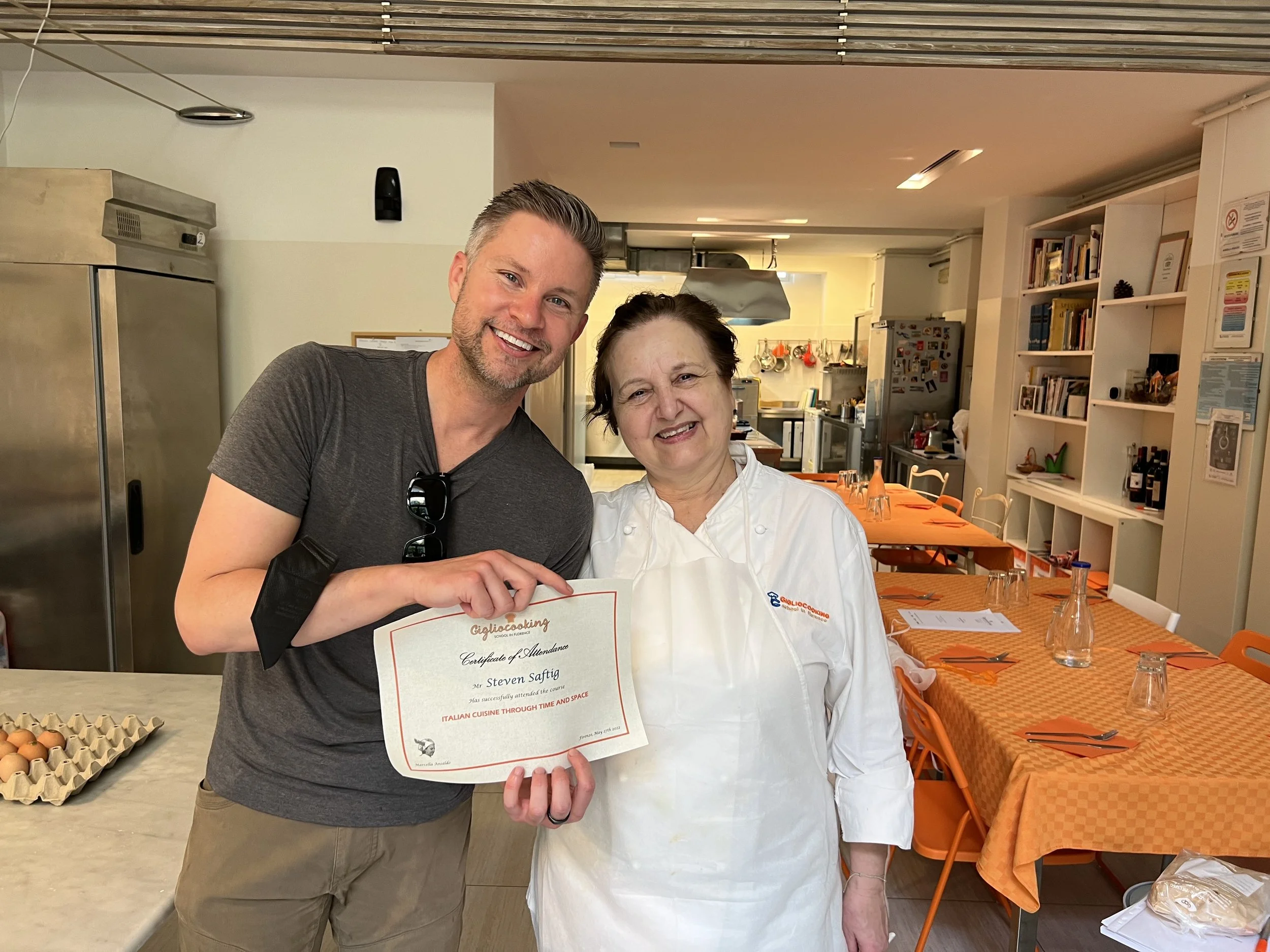5 Things I Learned at Cooking School in Florence
I’ve had a fraught relationship with cooking my whole life. The first time I ever cooked for myself, I took a lump of frozen-solid chicken from the freezer, put it on a plate, popped it into the microwave, and pressed the “defrost” button. When the microwave dinged, I took out the plate and was surprised to discover that the chicken breast was completely cooked. Or so I thought. As I began to cut into it, I noticed that three or four of the cubes were still pink. So I tossed all of the cubes into a pan and began to sauté them with some olive oil. As the chicken cooked, I lost track of which cubes were the formerly-pink ones. But rather than recognizing that this meant they were cooked, I was now convinced that I had three or four E.coli-bombs mixed in amongst the rest of the chicken. (If you’re reading this and thinking, “This is ridiculous. The chicken is obviously cooked!” I get it. I really had no idea what I was doing.)
So, I cooked and cooked and cooked the chicken until I was convinced that no E.coli could survive in any of the withered chunks of chicken in the pan. And then I sat down to eat. As you can imagine, it was not a pleasant experience. And because I was pretty strapped for cash at the time, I felt compelled to eat the chicken. This one experience had a lasting impact on my perception of cooking and, more importantly, ignited an enduring belief that I was a terrible cook.
Through the years, I tried to overcome this by forcing myself to cook and taking the occasional class (which usually focused on one particular dish or meal). And while my cooking skills definitely improved, I never…ever…considered the experience “fun.” It was always stressful for me. I came to loathe unreliable ovens and bought more than one oven thermometer, convinced that both the oven and the thermometer were broken. I always felt like I was teetering on the edge of ruining the entire meal.
Plus, do you know how easy it is to order takeout these days?
So I decided that Italy was where I would banish my fear of cooking once and for all. And I decided to do it in one of the most magical cities in the world: Florence. How I found my cooking school is whole other story (involving me almost wiring money to a shady bank account in Japan), but luckily, I let Trip Advisor lead the way and landed at the perfect school for me: Giglio Cooking School.
Like Venison in Headlights
My month as a student at Giglio was one of the most rewarding (and delicious) experiences of my entire life.
But I started out very, very timid.
As we were cooking, I would constantly ask “like this?” and apologized so many times that the school’s head chef Marcella eventually set down her spatula and said, “We don’t apologize in the kitchen! There is nothing you need to apologize for.”
The course is organized in stages, starting with a day devoted to the building blocks of cooking: sauces and broths. From there, the course builds on what we learned the previous day, becoming more and more complex along the way. Most days, we began at 9am with a brief introduction from Chef Marcella on the background and context for the lesson. Then, we donned our aprons, washed our hands, and got to cooking. Prep that required more time would already be completed for us (marinating, for example). Aside from that, we did all of the measuring, weighing, peeling, chopping, scaling, and mixing necessary to prepare the day’s recipes. And because there were multiple things on the menu each day, there was a lot to do. For example, if we were focusing on slow-cooked meats, Chef Marcella gave us the opportunity to cook (and try!) multiple different versions of slow-cooked meats. Or if we were making tomato sauce, we would prepare it a few different ways in order to experience (and taste!) the difference in methods.

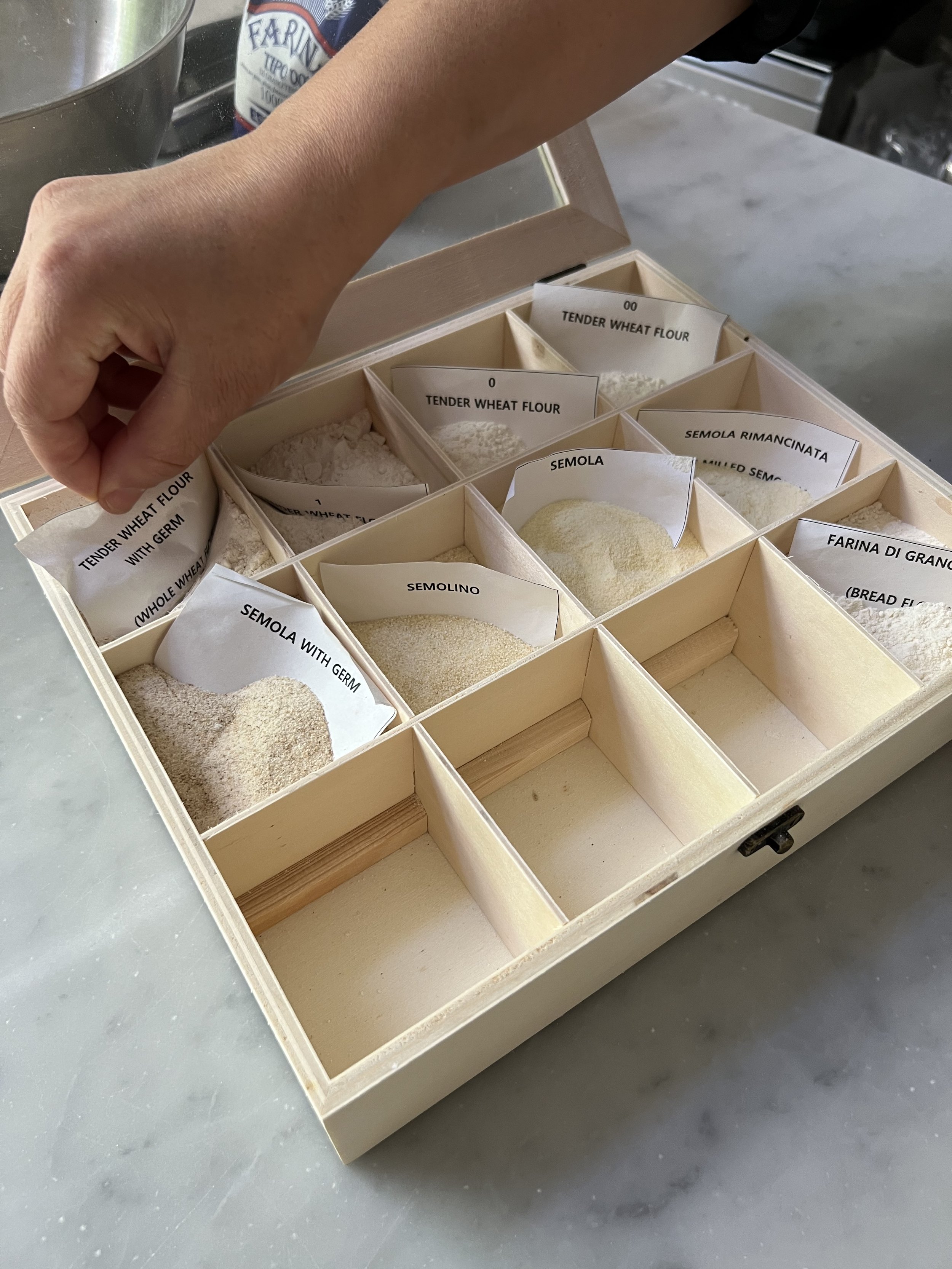
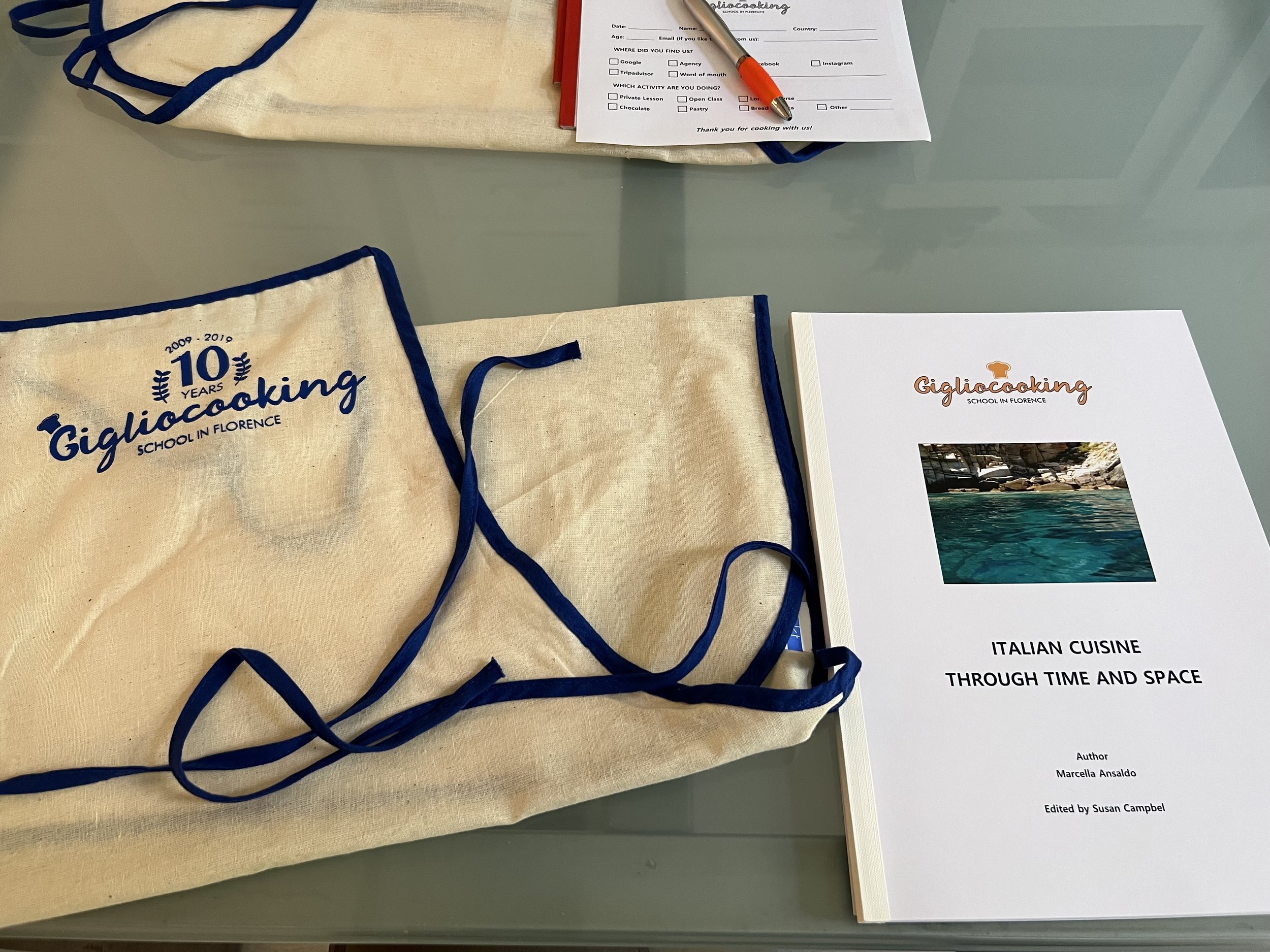
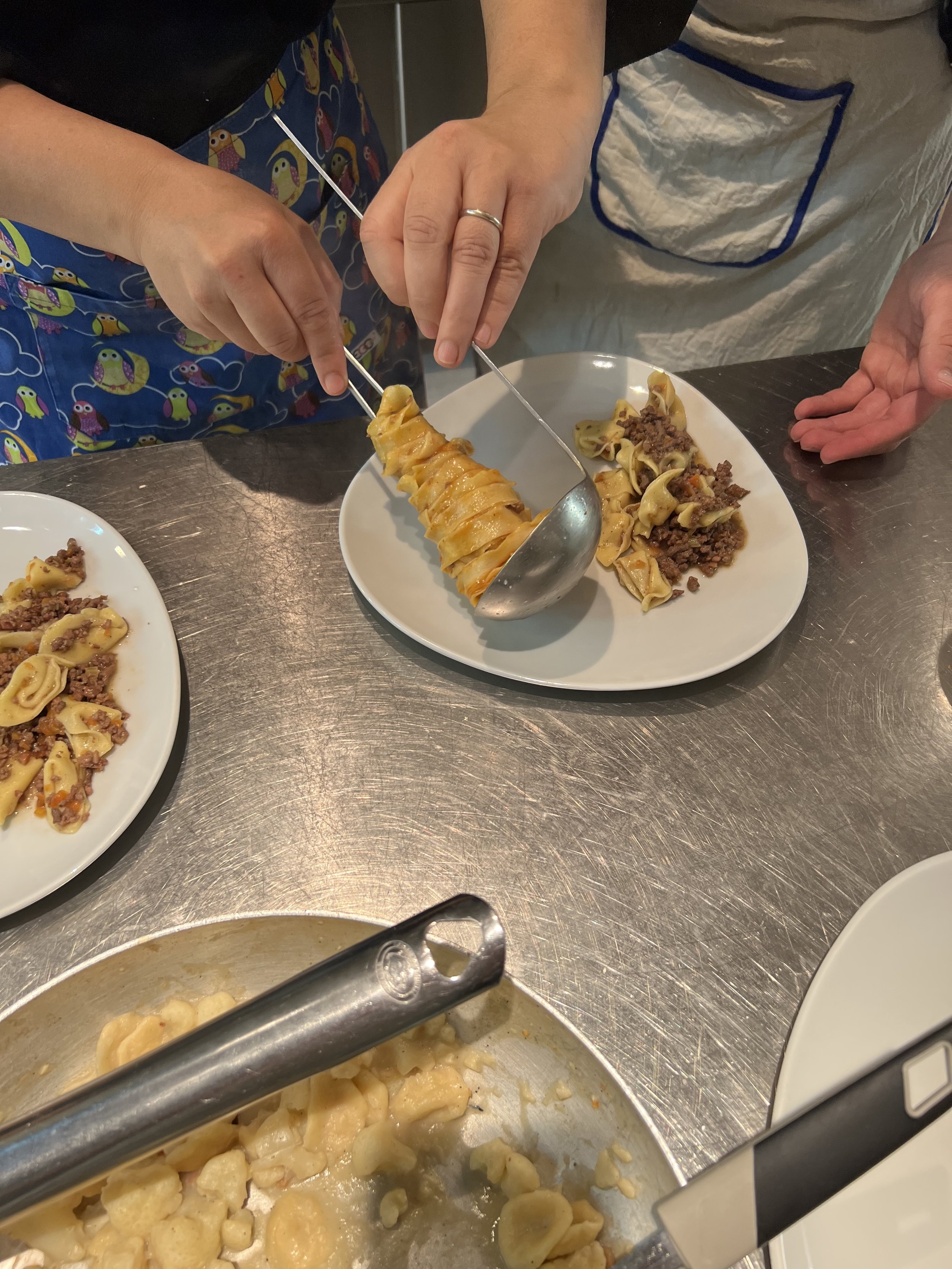
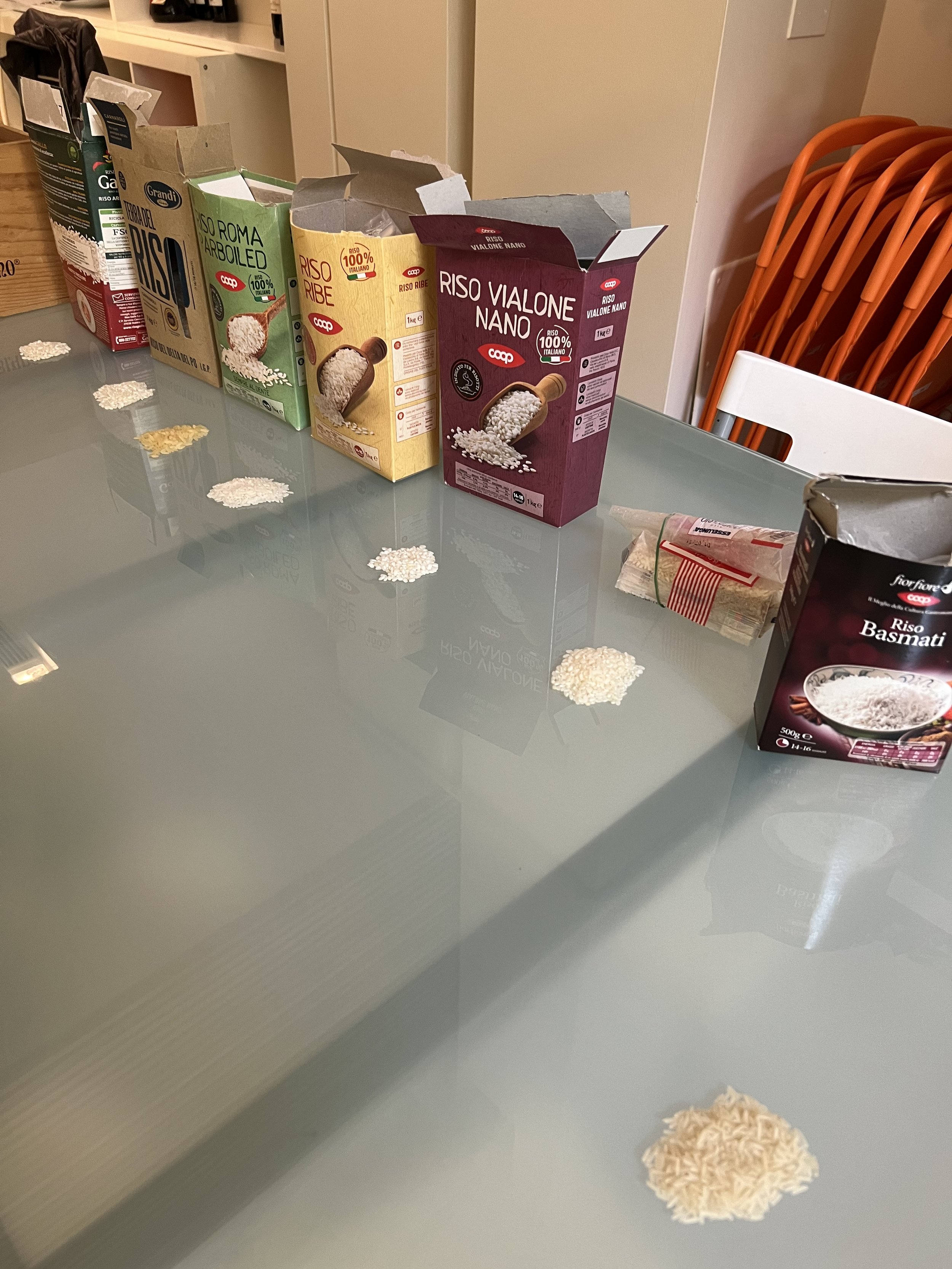
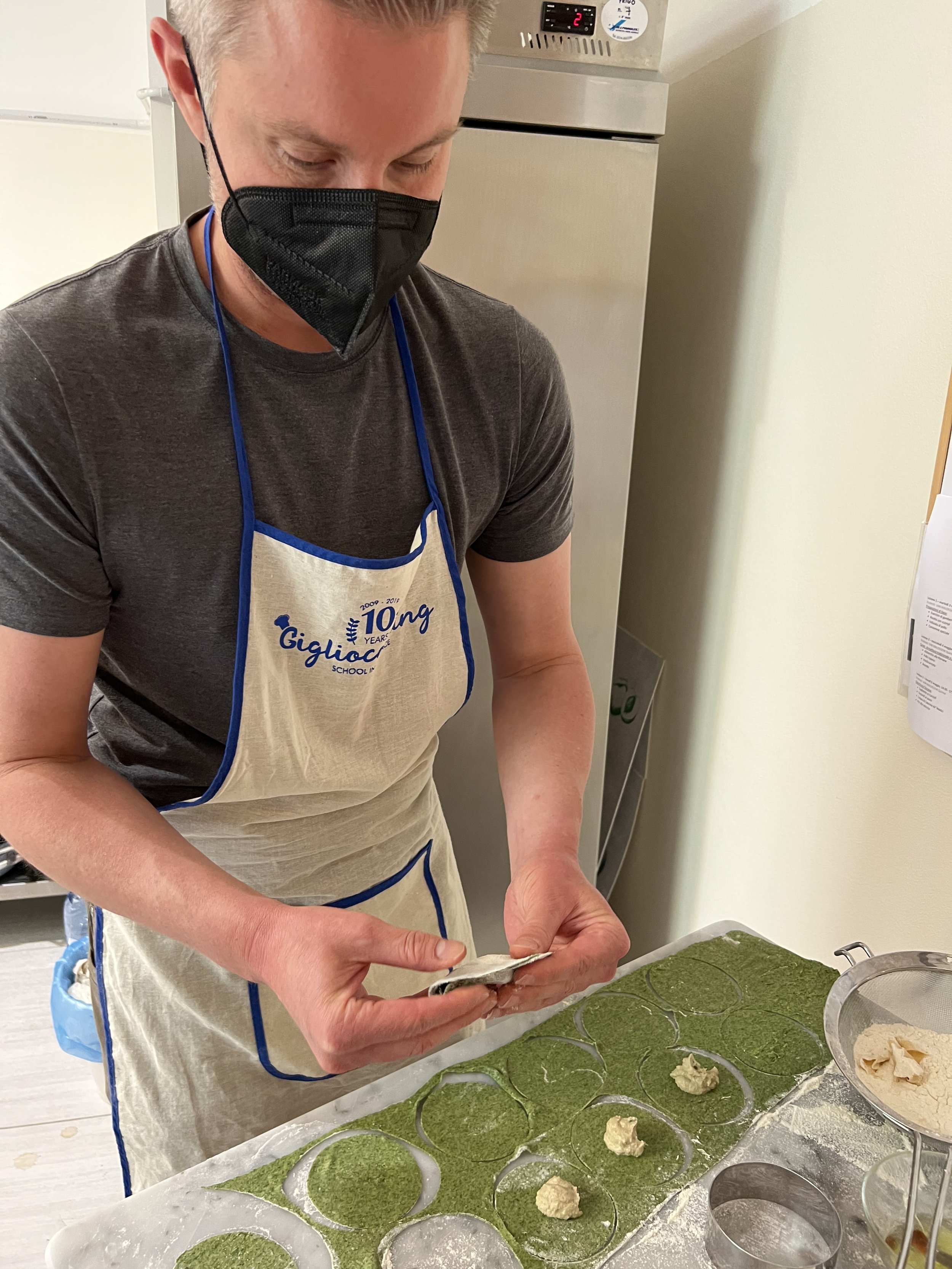
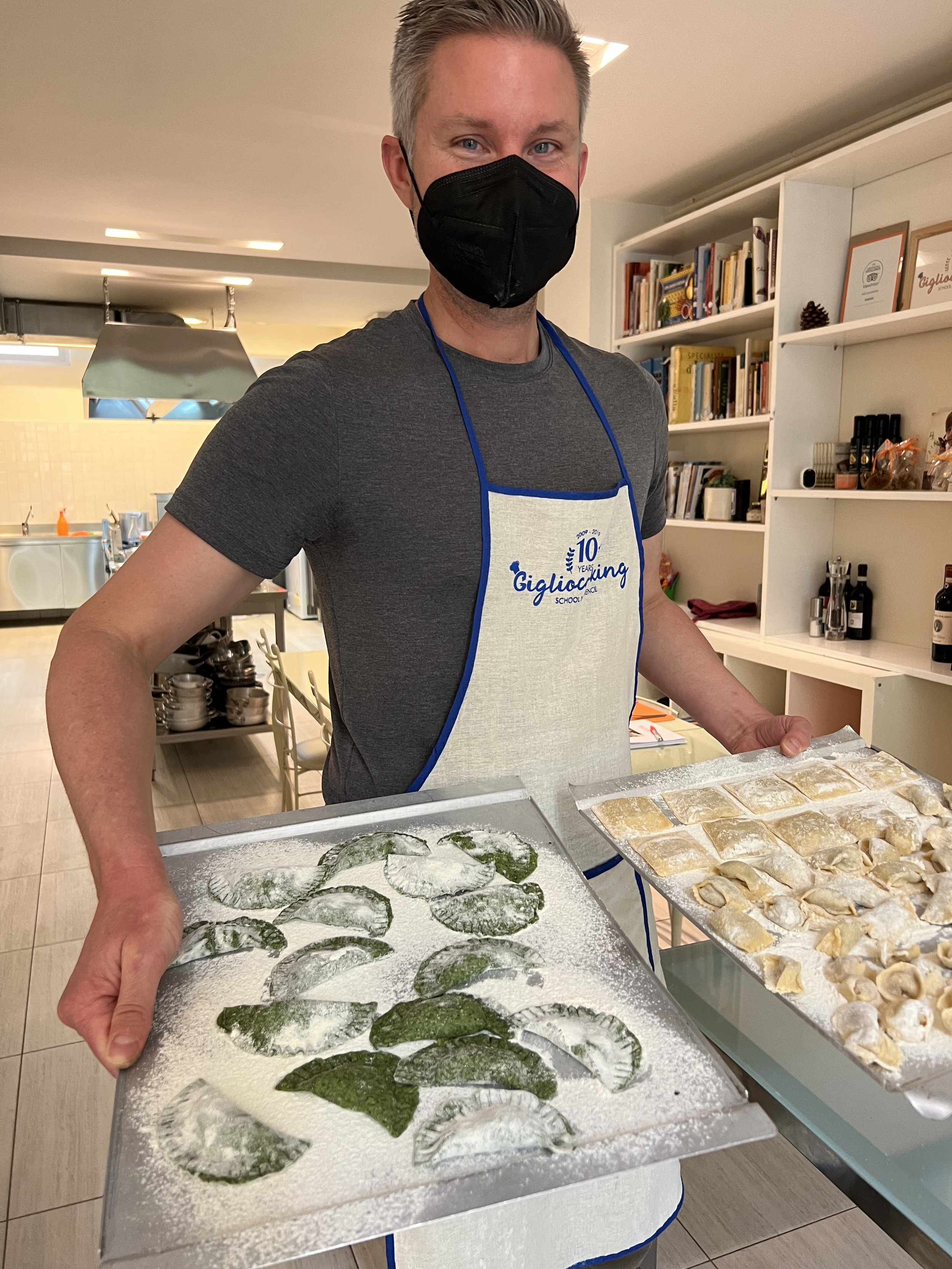
At the end of each day, we sat down to eat everything we had cooked. Yes, there was wine. (Never while cooking though!) While I didn’t partake every day, I did dreamily walk home in a wine haze on more than one occasion.
But perhaps the most luxurious part of the whole experience was Mena, Giglio’s dishwashing maven. While we cooked, Mena would stealthily maneuver between us, around us, and under us, removing dirty dishes, wiping counters, and intuitively offering utensils moments before we needed them. Chef Marcella often said that we would only be able to cook a fraction of the recipes we did each day if it wasn’t for Mena’s support. And I believe it.
One of my favorite aspects of the course was my “homework.” It started out as a playful joke between Chef Marcella and me. She would tell me about a pastry shop, for example, and then say “Go visit. That’s your homework.” When she realized that I was actually doing my homework, the number of assignments increased. My favorites were when she would send me to outdoor markets or kitchen stores almost exclusively attended by locals.
By the end of the course, I was brazenly weaving through the kitchen, stirring a pot here, tossing a pinch of salt in there, and making announcements that I wanted the garnish of fried carrot greens to be extra crispy in order to balance out the softness of the veal.
It’s hard to decipher which specific lessons or events created that shift within me, but I’ve been able to identify five realizations that I think contributed. So, here they are: the five things I learned during my month-long cooking course in Florence, Italy.
Lesson #1: Cooking is a relationship
One of the most profound lessons I learned from Chef Marcella was how cooking is really about being in relationship with the food. And good communication is at the foundation of all successful relationships.
Practically speaking, that means we take note of the size and consistency of the food we’re cooking before we even begin. Are the tomatoes extra small? Or are they on the larger side? No tomato is the same. So if a recipe calls for five tomatoes and you blindly throw in five small tomatoes, the recipe may not turn out right. I think this is often where I went wrong in my previous cooking disasters. I would follow recipes to the letter, but without paying much attention to the food I was actually working with. It seems so simple in retrospect, but this was a huge revelation for me.
Chef Marcella also often reminded me that we need to listen to the food. How does it sound when we’re cooking? Do we need to add more liquid to the pot? Is something bubbling over? Is one of the pots too quiet? Over the course of the four weeks, I learned to keep my ears consistently tuned into what was happening on the stove. Towards the end of the course, I would interrupt a conversation with Chef Marcella, and say, “Hold it! That pot is acting up and needs some attention. Be right back.”
Lesson #2: Cooking creates community
For the month of May, I happened to be the only student doing the entire month-long course. We would have other students join for a few days, or even a week at a time, but I was the only one who was there every day during that particular month. In a lot of ways, I was really happy about this. I had a ton of one-on-one time with Chef Marcella and got to be hands-on with every aspect of what we were cooking on those days.
That said, I also enjoyed it when other students joined us. I got to meet people from all over the world, with varying levels of cooking skills. One of my favorite interactions occurred on the day we were focused on fish. While we were cooking, there was a separate group of students working with another teacher from the school who specializes in desserts. Because this was their final lesson, the desserts they were making were some of the most gorgeous, grandiose confections I’ve ever seen. I mean, everything from intricate chocolates to ornate ice cream cake towers topped with elaborate, edible adornments.
When it came time to eat, I sat down to several plates of fish. And, I mean, delicious preparations of fish. But have you ever tried to enjoy a piece of fish when someone is savoring a freshly-made chocolate torte? Needless to say, the other class insisted that I join their celebration. They poured me a generous glass of champagne and demanded that I try every single thing they had made. And then insisted that I go for seconds. By the time they offered thirds, I was hyped up enough on sugar to decline.
To my surprise, they refused to accept any of my fish in return. Weird.
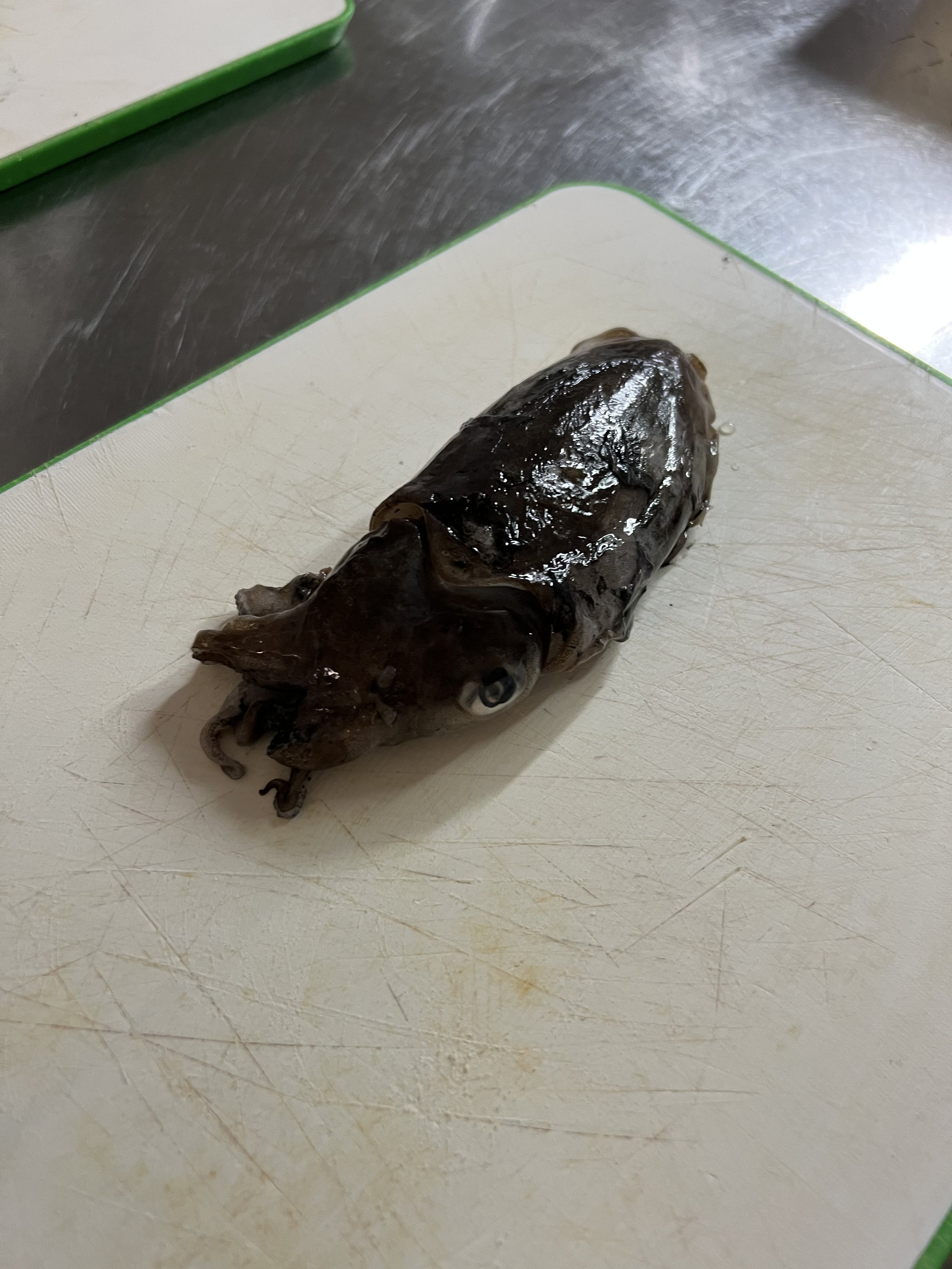
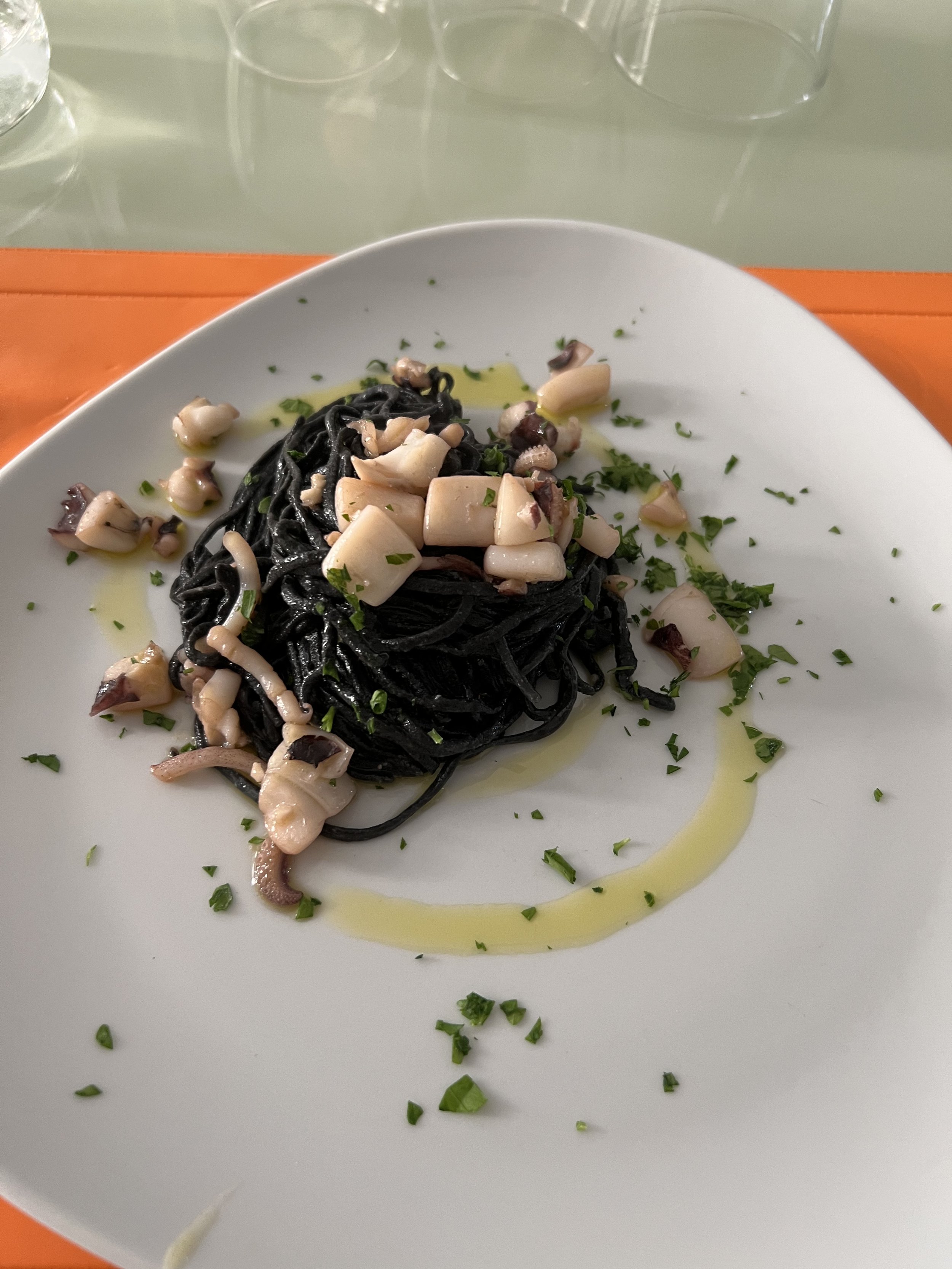
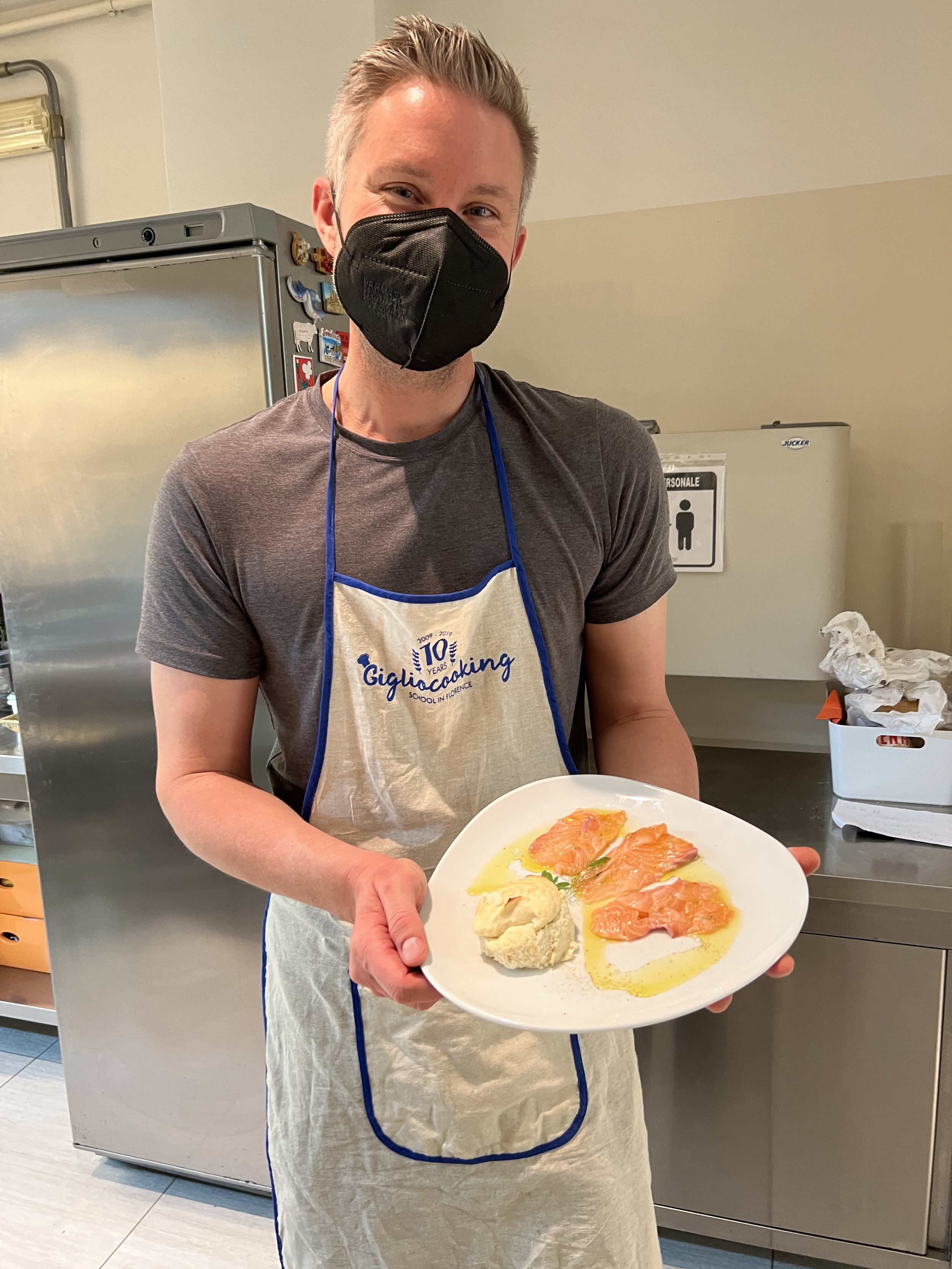
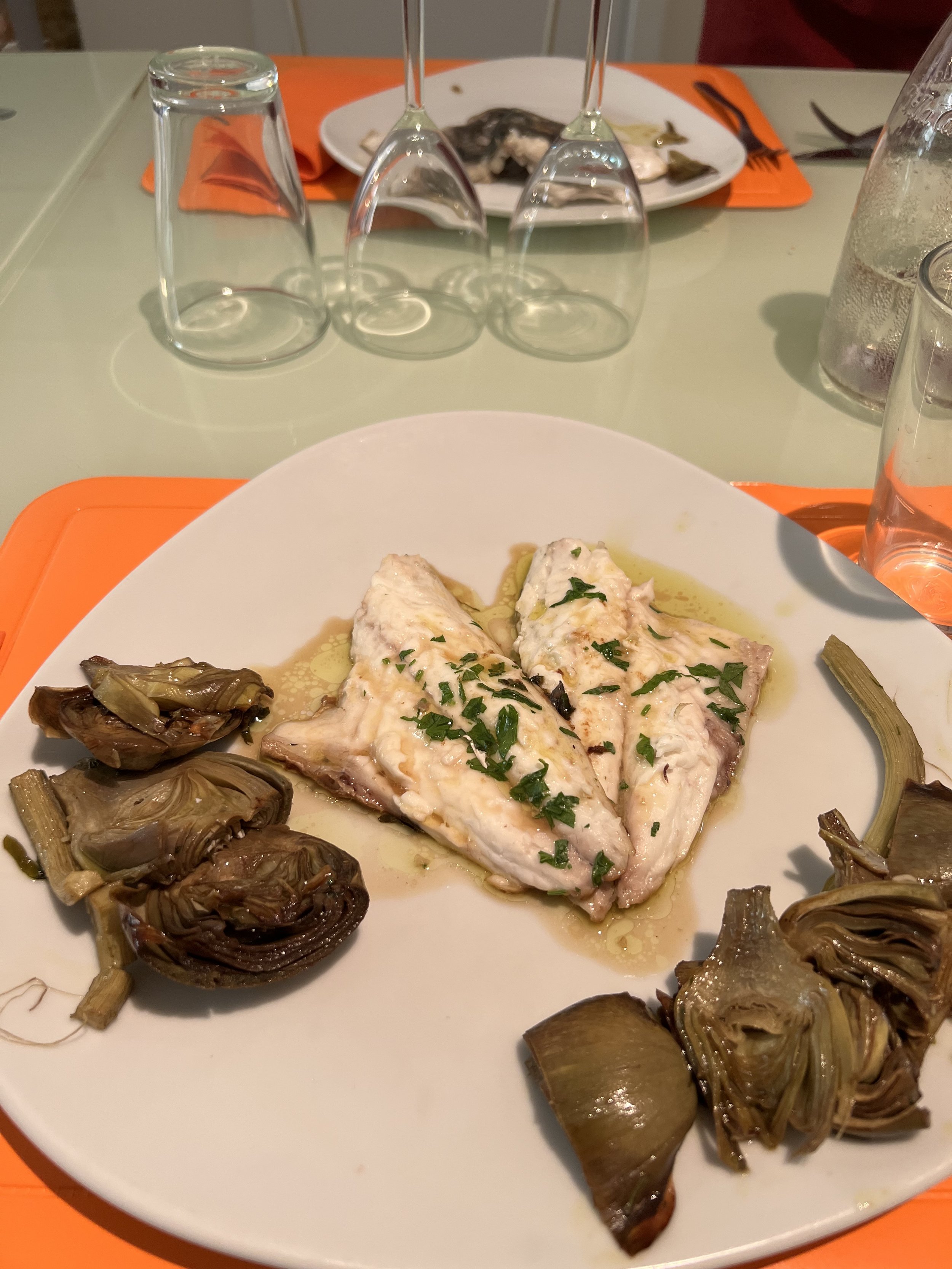
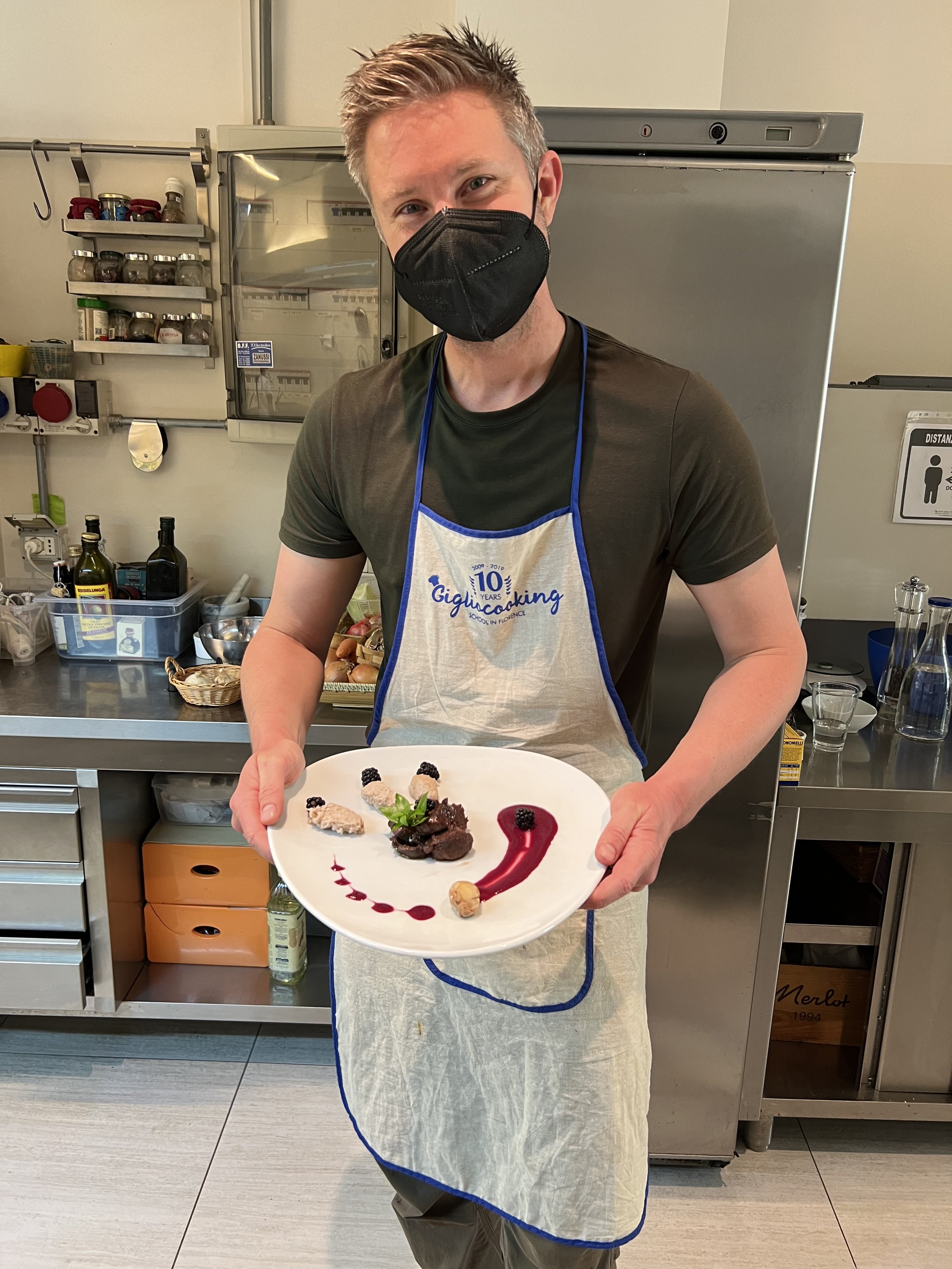
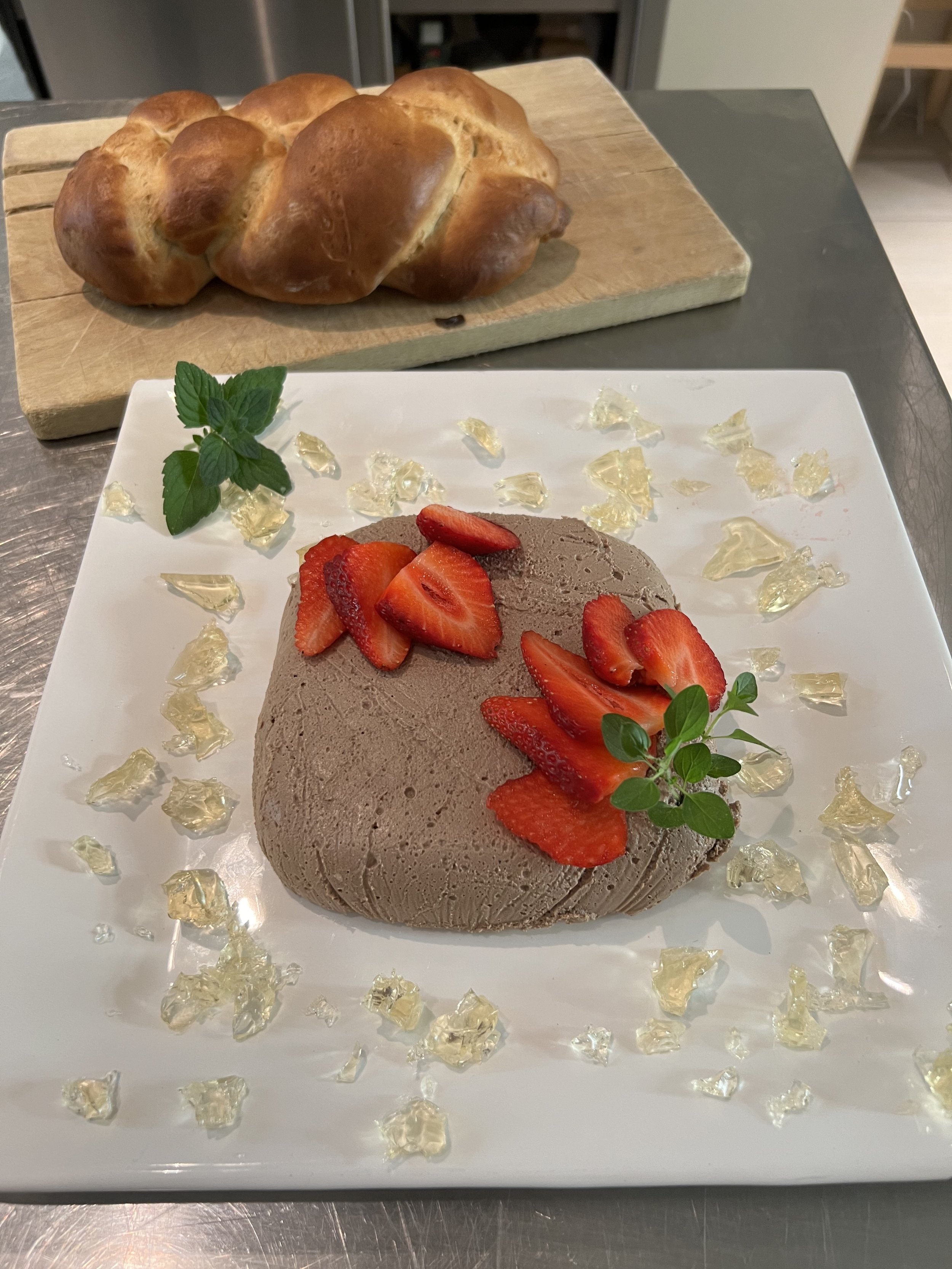
Lesson #3: Cooking is Challenging
I definitely did not come away from this course thinking that cooking is easy. I mean, cooking can be really, really challenging. But one of the most challenging days of the entire course wound up being one of my favorite days: gelato.
Chef Marcella started that lesson by telling me that there would be moments in the day when we would need to literally run. I thought, ‘Isn’t the number one rule of kitchens that you’re not supposed to run?’ But then I realized that I was getting kitchens and swimming pools mixed up, so I double-knotted my shoe laces and started some light stretching.
Making gelato is a delicate balance of temperatures…we had to get the mixture to a particular temperature in order to pasteurize it and then immediately get it into the freezer. Hence, the running. To top it all off, we made eight different types of gelato that day (fresh basil! roasted pear and gorgonzola! chocolate hazelnut!), so it basically turned into a mini track meet. And it was on this day that the perfectionist in me reared his well-coifed head. (Oh, AND the part of me that has a deep-seeded fear of E.coli too. That guy’s still kicking around.) But through it all, Chef Marcella kept her cool and occasionally would gently remind me to breathe. While she was probably saying this in reference to the heavy panting I was doing from all the sprinting back and forth to the freezer, I think she also meant it on a deeper level. Cooking is challenging. But we still must breathe.

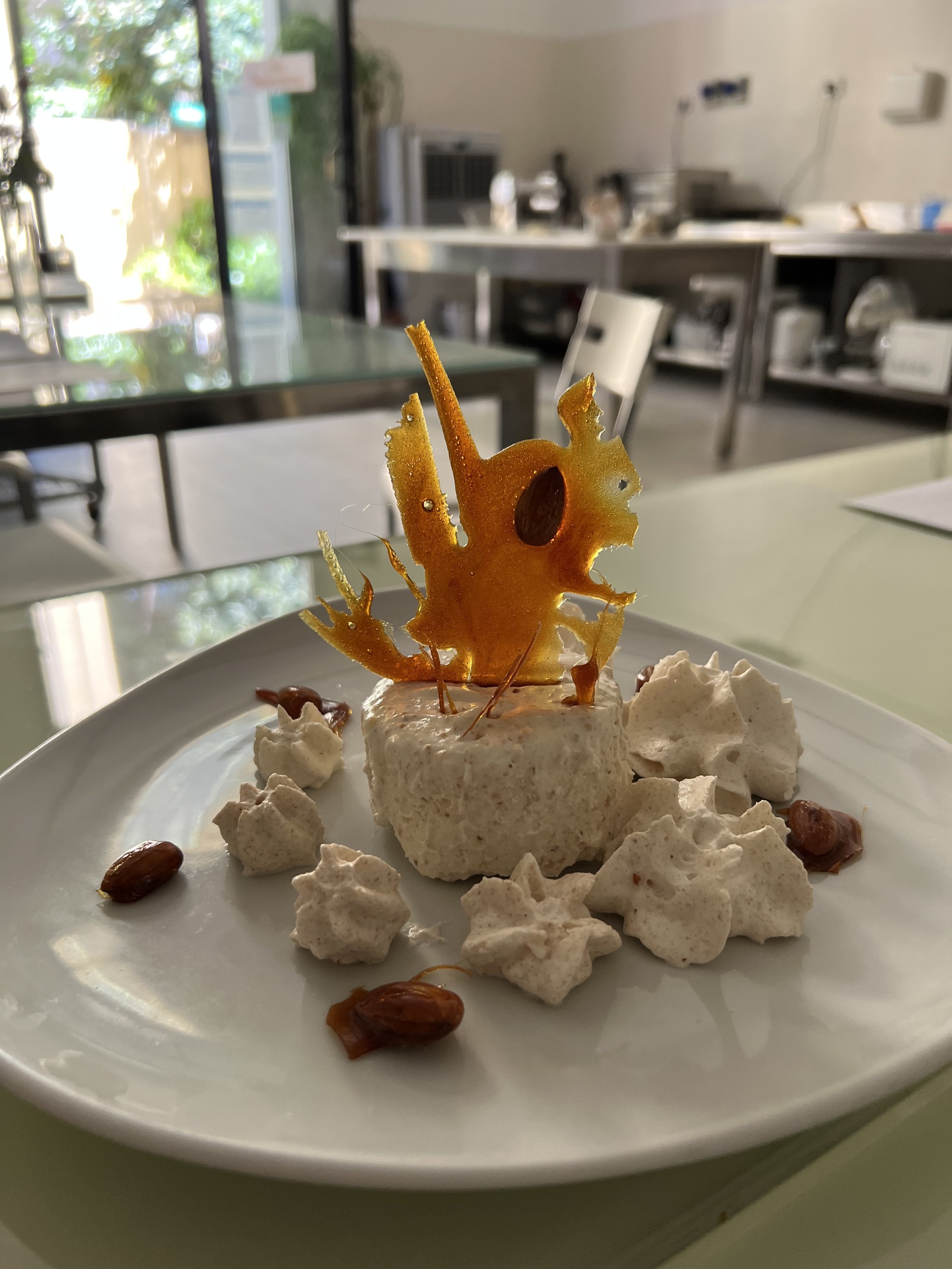
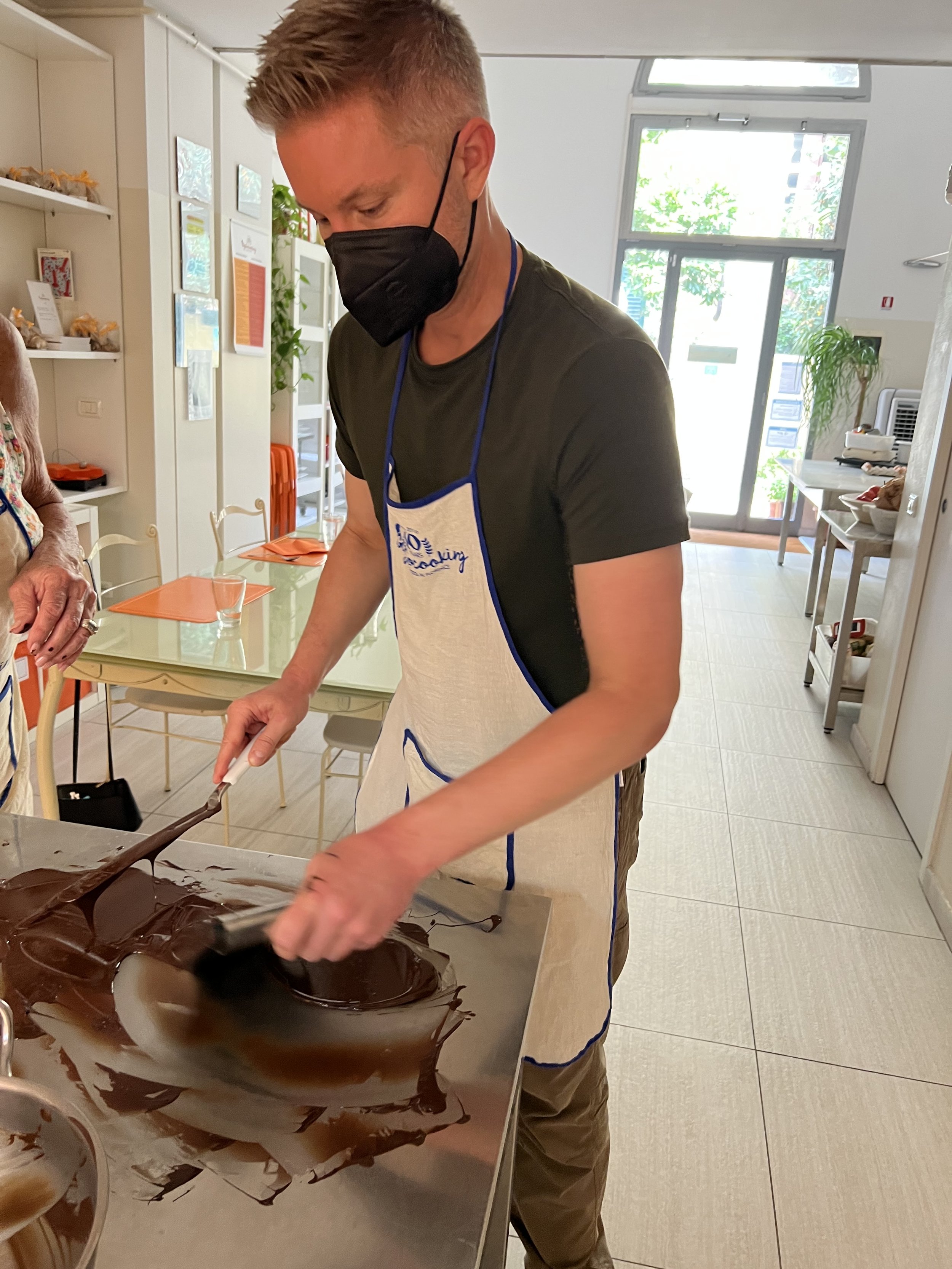
Lesson #4: Cooking Can Be Emotional
You know how I know that cooking is emotional? Because one day, I arrived for class and Marcella said, “Today’s lesson is going to be very emotional.” (My response: “More emotional than our gelato lesson?!”)
So, lobster.
For those of you who didn’t grow up in Cabot Cove, lobster is best when cooked fresh. Like, fresh-fresh. And while most people kill lobsters by throwing them into a pot of boiling water, we don’t actually know if that’s a humane way of killing them. We do, however, know that a humane way of killing a lobster is to pierce its head with a knife and quickly slide the knife down to the cutting board. If you just flinched, you see the conundrum here. Killing a lobster by throwing it in boiling water may feel more humane to us because we’re removed from the equation. Using a knife however, while definitely humane for the lobster, forces us to become an active participant in its death. And therein lies the emotion.
No doubt, lobster day was hard. But it was also the first time that I have ever eaten something that I personally killed. While it didn’t propel me into becoming a vegan, it did make me much, MUCH more conscious of the act of eating other beings.
I was also struck by how therapeutic cooking can be.
My month in Florence was difficult. I was still recovering from my sickness in Sicily. I wasn’t sleeping well. I was starting to feel pretty lonely after several months of traveling. And it was really, really hot.
So, there were a few days when I arrived at class, overheated and not in a great mood. And, to my surprise, cooking always, always made me feel better. I mean, me! The guy who dreaded cooking for years! At some point along the way, cooking went from being a source of stress to a source of healing. (Following my therapy with a decadent meal didn’t hurt either.)
Lesson #5: Cooking Doesn’t Have to Be Perfect
Across the four weeks of the course, I messed up. A lot. For example, I would toss the wrong pasta into the boiling water, which would force us to completely readjust our cooking schedule for the remainder of the morning. Or, I would let a pot dry out, which left a slab of meat crackling in a dry pan. I think my favorite mess up though was when Chef Marcella asked me to add a little cinnamon to our eggplant mousse. As someone who uses a heavy hand when adding cinnamon to my oatmeal in the morning, I started with three aggressive dashes of cinnamon before Marcella shrieked and said, “A lit-tle! A lit-tle!” (as she began scooping out the excess cinnamon). And I, no longer apologizing in the kitchen, said, “That IS a little!” From that point on, I would clarify between “little” and “cinnamon little” when asked to add “a little” of anything to a pot.
But time and time again, everything would still turn out delicious. Maybe not technically perfect, but delicious. Occasionally, Chef Marcella would teach me how to fix things. But more often than not, her response to me messing something up was a simple, gracious shrug.
And this is the lesson that felt most transformative to me as a cook. It’s okay to mess up. Great chefs do it all the time. So of course I will too. But like, honestly, who cares? The food will most likely still taste great. And if it’s completely inedible, you order takeout.
As someone who wrestles with perfectionism, this lesson also feels the most applicable to my life outside of the kitchen. It seems so silly to let a desire to be perfect prevent me from doing something joyful and rewarding—including cooking. Like, what a waste!
Burn the roast!
Boil the wrong pasta!
Over-cinnamon the mousse!
As I walked home on my last day of class, diploma in hand, I got choked up. It was a hot evening and the thick air glowed orange from the setting sun. I was sad that my cooking class had ended. Sad to be leaving Florence. And Italy. But mostly, I felt proud.
Food really is a gift. And the ability to prepare it in a way that is delicious and appealing is such a noble pursuit.
One of my favorite aspects of the course was when I would do something well and Chef Marcella would excitedly exclaim, “Bravo!” So now when I cook, I don’t focus on the mishaps. I watch for those moments to celebrate…the ‘bravo’ moments. And then I say it out loud…
Bravo!

